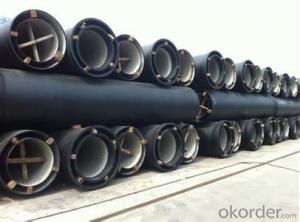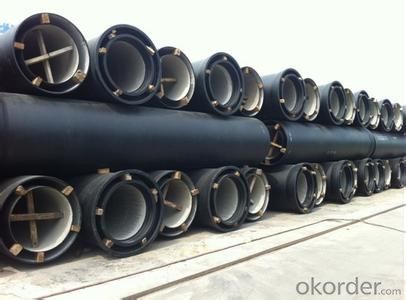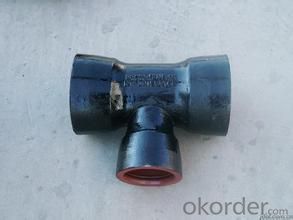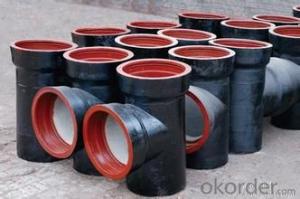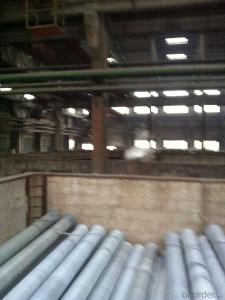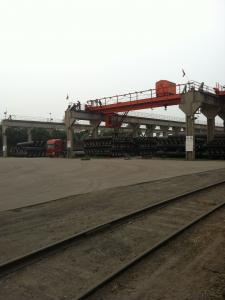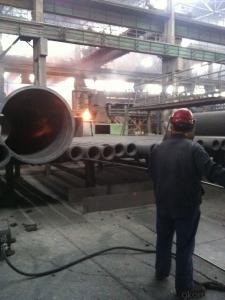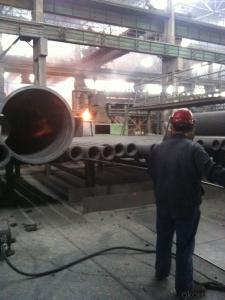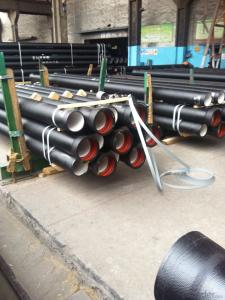DUCTILE IRON PIPES AND PIPE FITTINGS K9 CLASS DN100
- Loading Port:
- Tianjin
- Payment Terms:
- TT OR LC
- Min Order Qty:
- 22 pc
- Supply Capability:
- 3000 pc/month
OKorder Service Pledge
OKorder Financial Service
You Might Also Like
Material : Ductile Cast Iron
Size Range : DN 80mm to DN 2000mm
Unit Effective Length : 6m or 5.7m
Manufacture Standard: ISO 2531:1998/ EN 545:2006/EN 598:2007
Annual capacity : 200,000 tons
Coating Exterior: Zinc 130g/m2 according to ISO 8179-1 and bitumen coating 70 microns.
Cement Interior: Portland Cement/ High Alumina Cement/ Sulphate Resisting Cement Lining according to ISO 4179
Special requirements on external coating and internal lining can be applied
We also provide accessories such as SBR/EPDM rubber gaskets, lubricant paste, pipe caps, PE sleeves, etc.
Additional Parts:
Each pipe is strictly inspected according to related standard to ensure permanently high performance.
Easy Installation at site and service free for life
Long Service Lifespan
Quotation will arrive you within 24hours once we get your inquiry.
We guarantee offering you a competitive price.
A copy of original inspection reports of pipes will be offered after shipment.
Photos of loading process will be sent to the customer after shipment effect.
We will follow-up the delivery progress after shipment effect and update to the customer on weekly basis.
- Q: Can ductile iron pipes be used for underground fuel storage systems?
- No, ductile iron pipes are not suitable for underground fuel storage systems. They are more commonly used for water and sewer applications due to their strength and durability in carrying liquids. Underground fuel storage systems require materials that are specifically designed to handle the corrosive nature of fuel and prevent leaks or contamination, such as double-walled fiberglass or steel tanks.
- Q: Can ductile iron pipes be used for water main extensions?
- Yes, ductile iron pipes can be used for water main extensions. Ductile iron pipes have excellent strength and durability, making them suitable for carrying water over long distances and withstanding high pressure. They are corrosion resistant and have a long lifespan, making them a reliable choice for water main extensions.
- Q: Are ductile iron pipes resistant to UV degradation?
- Ductile iron pipes are not inherently resistant to UV degradation. Exposure to ultraviolet (UV) radiation from the sun can cause the degradation of various materials, including ductile iron. However, it is important to note that the rate of UV degradation in ductile iron pipes is relatively slow compared to other materials such as plastics or rubber. To mitigate the effects of UV degradation on ductile iron pipes, protective measures can be taken. Coating the pipes with a suitable UV-resistant paint or applying an external protective layer can help minimize the impact of UV radiation. Additionally, proper installation and maintenance practices can also contribute to the longevity and durability of ductile iron pipes. It is worth mentioning that while UV degradation may not be the primary concern for ductile iron pipes, other factors such as corrosion, chemical attack, or mechanical stress can still affect their performance and lifespan. Therefore, it is important to consider all potential environmental factors and apply appropriate protective measures accordingly.
- Q: How are ductile iron pipes protected against abrasion or wear?
- Ductile iron pipes are protected against abrasion or wear through various methods and protective coatings. One of the most common methods is the application of cement mortar lining on the inner surface of the pipe. The cement mortar creates a smooth and hard layer that resists the effects of abrasion and wear caused by the flowing water or other materials passing through the pipe. Additionally, ductile iron pipes can be externally protected by applying a bituminous or epoxy coating. These coatings provide a barrier against external factors such as soil or chemicals that may cause wear or corrosion. The coating acts as a protective layer, preventing direct contact between the iron pipe and the surrounding environment. Moreover, for areas with severe abrasion or wear conditions, special linings or coatings can be applied. Polyethylene encasement or polyurethane lining can be used to provide enhanced protection against abrasion, particularly in areas where the pipe is exposed to high levels of turbulence or abrasive materials. In some cases, ductile iron pipes can also be reinforced with additional materials such as fiberglass or steel wire to increase their resistance to abrasion or wear. These reinforcements provide an extra layer of protection, strengthening the pipe and reducing the likelihood of damage. Overall, ductile iron pipes are designed with a combination of protective measures to ensure their durability and resistance to abrasion or wear. These measures include cement mortar linings, protective coatings, special linings or coatings for severe conditions, and reinforcements. These protective methods help extend the lifespan of the pipes and maintain their functionality even in harsh environments.
- Q: Can ductile iron pipes be made into clear tubes?
- Of course, you can also use as a pipe, but because of the appearance of cast iron pipe is not very beautiful, but relatively brittle, by external impact or bad insulation cold winter break, so according to your use of the environment to determine.
- Q: How is ductile iron pipe tested for quality?
- Ductile iron pipe is extensively tested for quality to ensure its performance and reliability in various applications. The testing process involves several steps to assess the physical and mechanical properties of the pipe. One of the primary tests conducted on ductile iron pipe is the hydrostatic pressure test. This test involves subjecting the pipe to fluid pressure higher than its designed operating pressure to determine its ability to withstand internal pressure without leakage or failure. The pipe is filled with water or another suitable fluid, and pressure is gradually increased to the required level. The pipe is inspected for any signs of leakage or deformation during this test. Another crucial test is the tensile strength test, which measures the pipe's ability to resist pulling or stretching forces. A sample of the pipe is pulled until it breaks, and the maximum force applied during the test is recorded. This test helps determine the pipe's ultimate tensile strength, yield strength, and elongation properties. Ductile iron pipe is also tested for its impact resistance through the Charpy test. This test involves striking a notched sample with a swinging pendulum to measure the amount of energy absorbed by the pipe. It helps assess the pipe's ability to withstand sudden impacts or loads without fracturing. Additionally, the pipe undergoes various non-destructive tests, including ultrasonic testing, magnetic particle inspection, and visual inspection. These tests help detect any internal or external defects, cracks, or abnormalities that may affect the pipe's structural integrity. Furthermore, chemical analysis and metallographic examination are performed to evaluate the chemical composition and microstructure of the ductile iron pipe. These tests ensure that the pipe meets the required specifications and standards for its intended application. Overall, the testing process for ductile iron pipe is comprehensive and rigorous, aiming to guarantee its quality, durability, and overall performance in delivering water, wastewater, or other fluids safely and efficiently.
- Q: What are the different pressure ratings available for ductile iron pipe?
- The pressure ratings available for ductile iron pipe typically range from 150 psi to 350 psi, depending on the size and application of the pipe.
- Q: Are ductile iron pipes resistant to chloride-induced corrosion?
- Yes, ductile iron pipes are generally resistant to chloride-induced corrosion due to their protective coating and inherent chemical composition. However, the level of resistance may vary depending on the specific environment and concentration of chlorides present. Proper maintenance and regular inspections are still important to ensure long-term durability and prevent any potential corrosion issues.
- Q: How does ductile iron pipe compare to PVC pipe in terms of strength?
- Ductile iron pipe is generally stronger than PVC pipe in terms of strength. Ductile iron has a higher tensile strength and can withstand higher pressures and heavier loads compared to PVC, making it suitable for applications that require greater durability and strength.
- Q: What is the expected pressure class for ductile iron pipes?
- The expected pressure class for ductile iron pipes can vary depending on the specific application and the requirements of the project. However, generally speaking, ductile iron pipes are designed to handle high-pressure applications and are commonly available in pressure classes ranging from 150 psi (pounds per square inch) to 350 psi. These pressure classes indicate the maximum operating pressure that the pipe can withstand while maintaining its structural integrity. It is important to consult with industry standards and guidelines, as well as the project specifications, to determine the appropriate pressure class for ductile iron pipes in a given situation.
Send your message to us
DUCTILE IRON PIPES AND PIPE FITTINGS K9 CLASS DN100
- Loading Port:
- Tianjin
- Payment Terms:
- TT OR LC
- Min Order Qty:
- 22 pc
- Supply Capability:
- 3000 pc/month
OKorder Service Pledge
OKorder Financial Service
Similar products
Hot products
Hot Searches
Related keywords
